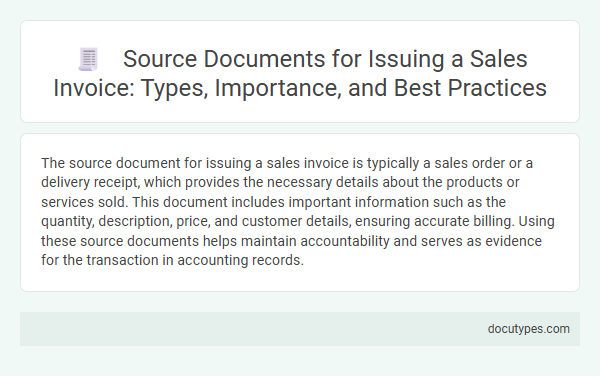The source document for issuing a sales invoice is typically a sales order or a delivery receipt, which provides the necessary details about the products or services sold. This document includes important information such as the quantity, description, price, and customer details, ensuring accurate billing. Using these source documents helps maintain accountability and serves as evidence for the transaction in accounting records.
Introduction to Source Documents in Sales Invoicing
Source documents play a crucial role in the sales invoicing process by providing the original evidence of a transaction. These documents include sales orders, delivery notes, and purchase requests, which serve as the foundation for creating accurate sales invoices. Understanding and managing source documents ensures proper record-keeping and verifiable financial transactions for businesses.
Defining Sales Invoices and Their Role in Business
| Topic | Details |
|---|---|
| Definition of Sales Invoice | A sales invoice is a commercial document issued by a seller to a buyer. It itemizes products or services provided, specifies quantities, prices, and total amounts due. The invoice serves as a request for payment and a record of the transaction. |
| Role of Sales Invoice in Business | Sales invoices facilitate financial tracking, support accounting records, and enable tax compliance. They help businesses manage receivables, monitor sales performance, and maintain transparent customer communication. |
| Source Document for Issuing a Sales Invoice | The main source document is the sales order or delivery note. These documents confirm product delivery or service completion, providing the necessary details to generate an accurate sales invoice. Other sources include purchase orders and agreements that outline terms of sale. |
| Importance of Source Documents | Source documents ensure invoice accuracy and legitimacy. They establish a verifiable audit trail, support financial audits, and prevent discrepancies in billing and payments. |
Key Types of Source Documents for Sales Invoices
The source document for issuing a sales invoice is essential for verifying and recording sales transactions accurately. These documents provide the necessary details to create an invoice that reflects the sale agreement between the buyer and the seller.
- Sales Order - This document outlines the customer's request for products or services and serves as the initial agreement for the sale.
- Delivery Note - It confirms that goods have been dispatched or delivered to the customer, supporting the transaction details on the invoice.
- Purchase Order - A buyer-issued document that authorizes the purchase and provides essential information used to prepare the sales invoice.
Importance of Source Documents in the Sales Process
What is the source document for issuing a sales invoice? The source document for issuing a sales invoice is typically the sales order or delivery note. These documents provide verified information about the products or services sold, ensuring accurate billing.
Why are source documents important in the sales process? Source documents serve as the foundation for sales invoices, maintaining the integrity of financial records. They help you track sales transactions, reduce errors, and support audit compliance.
Common Examples: Purchase Orders, Delivery Notes, and Sales Agreements
The source document for issuing a sales invoice is the original record that verifies the transaction between the buyer and the seller. It provides essential details needed to generate an accurate and legally compliant invoice.
Common examples of source documents include purchase orders, delivery notes, and sales agreements. Purchase orders confirm the buyer's request, delivery notes verify the shipment of goods, and sales agreements outline the terms and conditions agreed upon by both parties.
How Source Documents Ensure Accurate Invoicing
The source document for issuing a sales invoice is typically a sales order or delivery note, which records the details of the transaction between the seller and buyer. These documents provide the essential information needed to create an accurate and verifiable sales invoice.
Source documents ensure accurate invoicing by capturing the exact quantities, prices, and product descriptions agreed upon during the sale. They reduce errors by offering a clear reference for invoice preparation and validation. Your accounting team can rely on these documents to maintain transparency and uphold financial integrity.
Legal and Compliance Considerations for Source Documents
The source document for issuing a sales invoice is a critical record that verifies the transaction between buyer and seller. It must comply with legal and regulatory standards to ensure accuracy and legitimacy.
- Original Purchase Order - Acts as the initial agreement outlining the products or services requested, essential for invoice validation.
- Delivery Note - Confirms that goods or services have been provided, supporting the invoice's authenticity and completeness.
- Compliance with Tax Regulations - Ensures the invoice reflects accurate tax information according to jurisdictional requirements, preventing legal penalties.
Your adherence to maintaining proper source documents protects against disputes and supports audit trails.
Best Practices for Managing and Storing Source Documents
The source document for issuing a sales invoice is typically the sales order or delivery receipt that records the transaction details. Proper management and storage of these documents ensure accuracy and compliance in your invoicing process.
- Maintain organized filing systems - Store source documents in clearly labeled folders for easy retrieval and audit readiness.
- Digitize source documents - Use scanning and cloud storage solutions to secure documents and prevent loss or damage.
- Implement retention policies - Retain all source documents according to legal and organizational requirements to support financial records and tax audits.
Digital Transformation: E-Documents and Sales Invoicing
The source document for issuing a sales invoice is typically a sales order or delivery note that confirms the transaction details. In the era of digital transformation, these documents are increasingly generated and stored as e-documents, enhancing accuracy and accessibility.
Digital sales invoicing relies on electronic source documents to automate the billing process and reduce errors. Your business benefits from faster processing times and improved record-keeping through the use of these digital sources.
What Is the Source Document for Issuing a Sales Invoice? Infographic

